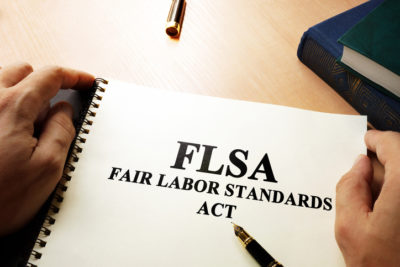The Fair Labor Standards Act (FLSA) mandates the federal minimum wage level and requirement to pay employees overtime for hours in excess of 40 per workweek. While there are many more components to the FLSA, these are two that tend to get a lot of attention.

Most employers are subject to the FLSA, but there are a few notable exceptions. For example, these employees will be exempt from FLSA minimum wage and overtime regulations:
- Employees at businesses with fewer than two employees
- Employees at businesses that have an annual revenue of less than $500,000 and who do not engage in interstate commerce[i]
- Railroad workers (covered instead by the Railway Labor Act)
- Truck drivers (covered instead by the Motor Carriers Act)
- Independent contractors and freelance workers (they’re not employees)[ii]
- Some agriculture workers
- Babysitters[iii]
- Newspaper delivery workers
- Apprentices
- Movie theater employees (specifically excluded)
Separately, there are some types of employees who may be exempt from some portion of the FLSA but work for an employer that is subject to the act. Most commonly, this applies to employees who fall under one of the overtime exemption categories:
- Administrative
- Executive
- Professional
- Computer
- Outside sales
- Highly compensated individuals
For employees who qualify for one or more of these exemption categories, the employer will not be required to pay overtime for hours worked in excess of 40 hours in a workweek. They’re still subject to minimum wage obligations (except for the outside sales exemption), but typically, this is a nonissue because one of the requirements for most of these exemptions is that the employee must be paid a salary that is at least $684 per week.
The key is to remember that employers need to be well-versed in their obligations under the FLSA. For most employers, all employees will be covered and subject to minimum wage and overtime rules and more.
This means employers should confirm that all employees are being paid appropriately, all hours worked are being tracked and paid, and all overtime is being calculated properly and paid as needed.
It’s also important to note that many states have more restrictive laws than the FLSA regarding which employees are subject to minimum wage and overtime obligations. States also may set minimum wage requirements that are higher than the federal minimum wage.
[i] Note: Interstate commerce has a very broad definition under the law. It can even include things like sending mail or making calls to another state.
[ii] Note: It’s imperative that employers properly classify individuals who work for them. Simply stating someone is an independent contractor does not suffice, even if that person agrees to those terms.
[iii] Note: Babysitters who are simply performing babysitting duties occasionally are generally not covered, but household employees who perform childcare activities on a weekly basis typically are covered, at least for minimum wage requirements, though not always for overtime requirements.
Bridget Miller is a business consultant with a specialized MBA in International Economics and Management, which provides a unique perspective on business challenges. She’s been working in the corporate world for over 15 years, with experience across multiple diverse departments including HR, sales, marketing, IT, commercial development, and training.
